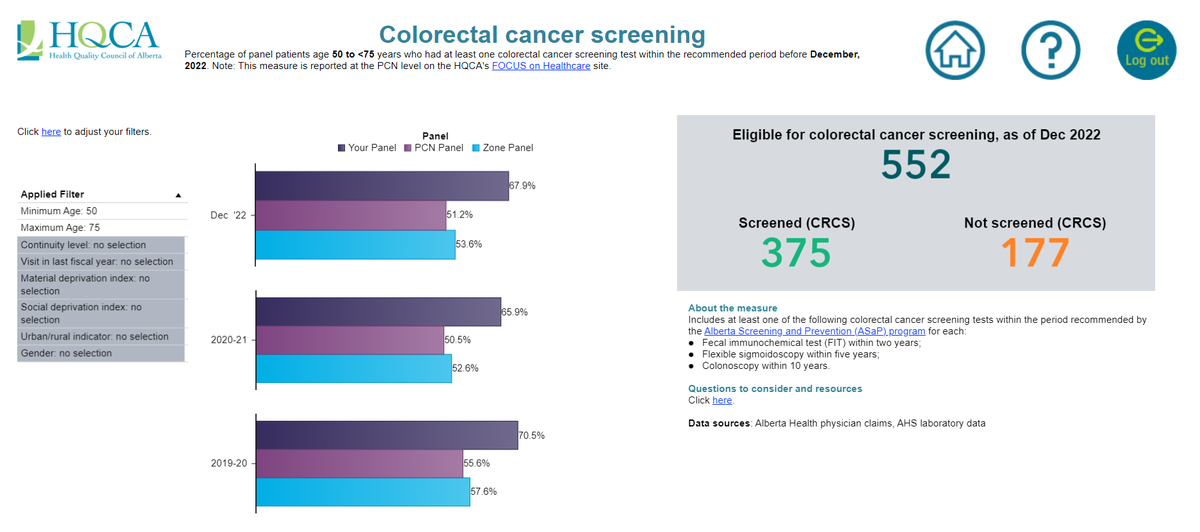Like many family physicians these days, Dr. Oliver David is targeting colorectal cancer screening in the aftermath of the COVID-19 pandemic.
How did he identify this need? He reviewed his primary health care panel report, a free confidential report on his practice provided by the Health Quality Council of Alberta (HQCA).
“COVID restrictions have been a barrier to colorectal cancer testing – I just didn’t appreciate how much,” says Dr. David, who has been practicing at the 17th Avenue S.E. Medical Centre in Calgary for 30 years.
In Alberta, the HQCA panel reports are considered an invaluable analytical tool to support quality improvement at various levels of the primary health care system. They contain dozens of measures from various administrative sources to provide family physicians, clinics and primary care networks (PCNs) with access to data about preventative care, chronic conditions, pharmaceuticals and more – information they’d have difficulty discovering on their own. Colorectal cancer screening information is an excellent example.

“The HQCA pulls screening information from Netcare, so it’s a different picture than just trying to run a query on your own EMR,” says Dr. David. “No matter where in the province my patients receive their screening test, it will show up in my panel report.”
With this information, Dr. David saw precisely how much COVID-19 interrupted colorectal cancer screening not only with patients at his practice but across his primary care network and the province.
When Dr. David logs into his panel report – which provides information based on his confirmed patient list – he can compare his patient data over three years. He can also dive deeper into specific patient populations by gender, age or condition – for example, to better understand the gaps or variances. He can even pull a patient list of those who may be due for screening.
“It was apparent to me, my practice facilitator and team that there was room to improve on my colorectal cancer screening rates,” he says. “So we’re working together on a few simple things. We set up time-based reminders for patients who are eligible for screening. We opportunistically provide FIT tests. And we follow up with eligible patients to provide instructions on ordering a FIT test.”
Dr. David says he will evaluate the results of his team’s efforts when the HQCA releases updated data to see if the screening rates show improvement.
“This is the type of routine, continuous quality improvement that occurs every day in primary care clinics across the province – and tools like the HQCA’s primary healthcare panel reports make it easier,” he says.
The HQCA has long recognized the value that family physicians place on accurate screening data. This year, for the first time ever, there will be twice-annual updates on patient data for colorectal, breast and cervical cancers.
HQCA Lead Data Manager, Jody Pow says, “A lot of the changes we make to panel reports come from discussions with our partners in the health care system – and more frequent data updates have been requested.”
On an ongoing basis, the HQCA meets with Alberta Health, Alberta Health Services, the Alberta Medical Association, the College of Physicians and Surgeons of Alberta, the Physician Learning Program, Alberta College of Family Physicians, PCNs and others to generate this resource.
The HQCA is nicely positioned to produce and disseminate these confidential reports because it doesn’t have a regulator or funder role in the health care system. The HQCA’s legislated mandate is to promote and improve health service quality, patient safety and person-centred care. Pow says the HQCA’s primary intent is to help physicians become proficient in understanding and acting on their own data by giving them a curated, easy-to-use and customizable tool for quality improvement purposes.
“We’re trying to create awareness among primary care providers about what the reports offer so they can identify improvement actions on their own, based on how they deliver care and how their patients use the health care system,” he says.
It’s important to know that the panel reports work in concert with other primary care system initiatives. For example, developing an action plan and implementing change based on the data in an HQCA panel report qualifies as a practice-driven quality improvement activity with the College of Physicians and Surgeons of Alberta’s Physician Practice Improvement Program (PPIP).
Currently, about half of all family physicians in Alberta have signed up to receive a panel report from the HQCA, with the numbers increasing every year. Dr. David is one of the many physicians who actively use the reports for quality improvement activities. In fact, he saw such value in the panel reports that he partnered with the HQCA in 2022 to provide a physician perspective on the HQCA team that develops them.
“It’s easy for me to champion the use of data in family medicine,” he says. “I’ve personally seen the impact that audit and feedback tools like panel reports have provided my practice over the years. Whether it’s colorectal cancer screening or something else, I find I always learn something new about my panel that can help me to get better.”
More information
Learn more
Request a report
CPSA’s Physician Practice Improvement Program (PPIP)
Banner image: Dr. Oliver David with team members Julie Tanpangco (l) and Marlin Royo (r) at the 17th Avenue S.E. Medical Centre, Calgary.

